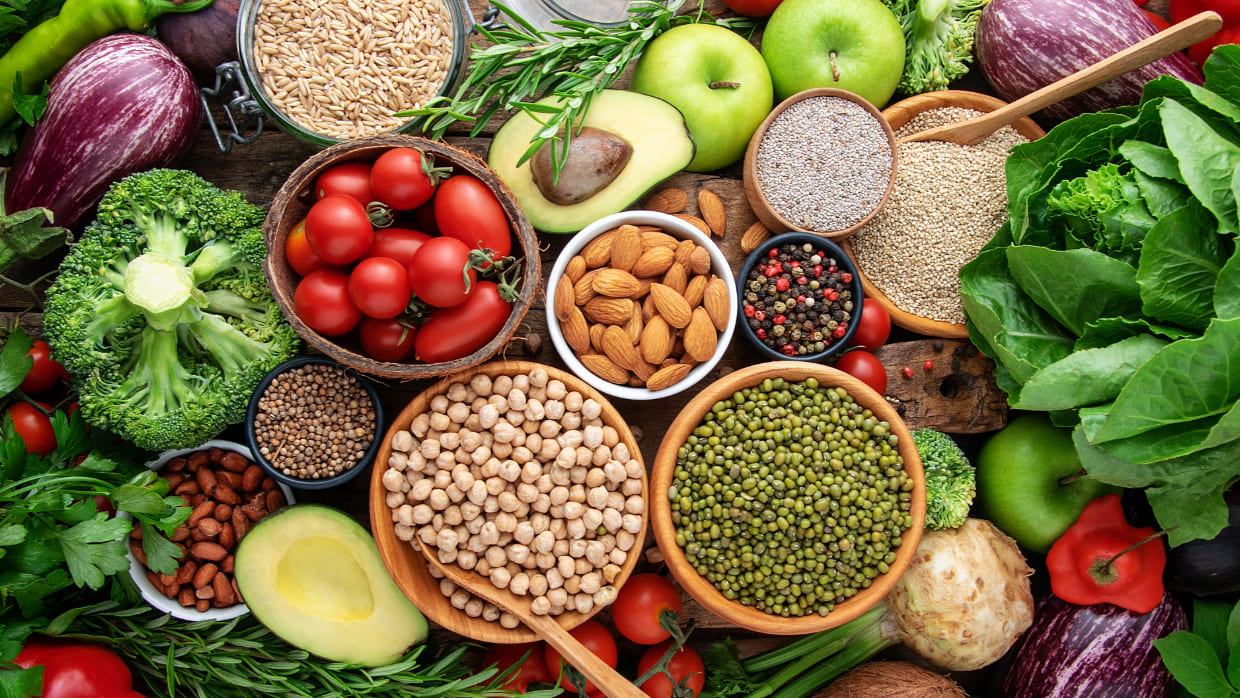Food Connects Us: National Nutrition Month 2025

Eating good food is the foundation of health. Yet food is much more than energy and nutrients:
- Eating provides comfort, pleasure, and socialization.
- Food is an important part of our cultural and religious practices.
- Sharing food is a basic aspect of friendship, hospitality, and concern for the less fortunate.
- Food selection has an impact on the environment of our planet and compassion for animals.
- The choice of food can prevent, treat, or reverse disease.
Food unites us as human beings. This is why the Academy of Nutrition and Dietetics has chosen “Food Connects Us” as the theme of National Nutrition Month for March 2025.

Connecting Our Health with Our Planet’s Health
Our food choices connect us individually and globally. Increasing the consumption of whole grains, fruits, vegetables, legumes, and nuts has become a message shared by scientists in the medical and environmental communities.
Many chronic health issues such as obesity, diabetes, heart disease, and certain cancers have been linked to diets high in red meats and processed foods while low in fruits, vegetables, beans, and whole grains.1 It is estimated that only 10% of Americans eat the recommended daily number of fruits and vegetables.1,2 Sodexo Registered Dietitian Nutritionists (RDNs) work diligently to encourage the consumption of more whole, unprocessed foods for both disease prevention and management.
Limiting animal food intake has also been identified as a critical strategy to address climate change. Greenhouse gas emissions are lower in the production of food from plants rather than from livestock.3-5 Beef requires twenty times more land and emits twenty times more greenhouse gas emissions per gram of edible protein than common plant proteins such as beans.3,6
While animal foods do provide important nutrients and can be a pleasurable part of eating, the overall message for the health of people and the planet is to eat more plant foods. Meals that are abundant in plant ingredients like vegetables and grains can be found in each native cuisine.
Plant-Forward vs. Plant-Based
In recent years the terms “plant-forward” and “plant-based” have been used to describe foods, meals, and diets that feature ingredients from plants. Sodexo defines these terms as:
- Plant-Forward - Plant-forward is a style of cooking and eating that emphasizes and celebrates, but is not limited to, foods from plant sources – fruits, vegetables, whole grains, legumes, nuts, seeds, plant oils, herbs, and spices.7 Foods from animal and marine sources (meat, poultry, dairy, eggs, fish, shellfish) may be included but are minimized.
- Plant-Based - Plant-based refers to foods derived only from plant sources.8 It does not include any animal or fish products. A vegan diet is considered a plant-based diet.
Sodexo’s Clinicia™ Patient Menu: Supporting Health and Culture
The menu designed for Sodexo healthcare facilities includes the nutritional requirements of different therapeutic diets. Sodexo RDNs and chefs are the developers of the menu and oversee its implementation throughout the United States. Featured are several dishes that emphasize fruits, vegetables, and grains and celebrate different cuisines from around the world. Here are a few examples of foods patients can enjoy during their hospitalization:
- Creamy Cajun Jambalaya Pasta - Pasta tossed in creamy Cajun sauce, studded with mushrooms, carrots, onions, and sun-dried tomatoes.
- Santa Fe Sunrise Breakfast Burrito - A breakfast burrito bursting with seasoned potatoes, refried beans, and pico de gallo wrapped in a flour tortilla.
- Italian Quinoa Bowl - Veggie-packed quinoa bowl with sauteed onions, celery, carrots, and tomato, seasoned with garlic and Italian parsley.
Connecting the Many Dimensions of Food
Sodexo’s knowledgeable RDNs and talented chefs help people connect their physical, social, and emotional needs for food. With the Clinicia™ Patient Menu, patients learn to include more plant foods in their diet without sacrificing taste, satisfaction, and pleasure. They are also introduced to the flavors of different cultures. Sodexo’s healthcare menu exemplifies the Clinicia™ focus area of fusing culinary mastery with clinical expertise for operational excellence.
References:
- Dietary Guidelines for Americans, 2020-2025. 9th ed. U.S. Department of Agriculture and U.S. Department of Health and Human Services. Published December 2020. Accessed February 3, 2025. https://www.dietaryguidelines.gov/sites/default/files/2021-03/Dietary_Guidelines_for_Americans-2020-2025.pdf
- Lee SH, Moore LV, Park S, Harris DM, Blanck HM. Adults Meeting Fruit and Vegetable Intake Recommendations - United States, 2019. MMWR Morb Mortal Wkly Rep. 2022 Jan 7;71(1):1-9. doi: 10.15585/mmwr.mm7101a1
- Waite R, Searchinger T, Ranganathan J, Zionts J. 6 Pressing Questions About Beef and Climate Change, Answered. World Resources Institute website. Published March 7, 2022. Accessed February 3, 2025. https://www.wri.org/insights/6-pressing-questions-about-beef-and-climate-change-answered
- Dixon KA, Michelsen MK, Carpenter CL. Modern Diets and the Health of Our Planet: An Investigation into the Environmental Impacts of Food Choices. Nutrients. 2023 Jan 30;15(3):692. doi: 10.3390/nu15030692
- Food, Planet, Health. Summary Report of the EAT-Lancet Commission. Published 2019. Accessed February 3, 2025. https://eatforum.org/content/uploads/2019/07/EAT-Lancet_Commission_Summary_Report.pdf
- Ritchie H. Less meat is nearly always better than sustainable meat, to reduce your carbon footprint. Our World In Data website. Published February 4, 2020. Accessed February 3, 2025. https://ourworldindata.org/less-meat-or-sustainable-meat
- Menus of Change. Plant-Forward by the Numbers. The Culinary Institute of Medicine and the Harvard T.H. Chan School of Public Health. Published 2020. Accessed February 3, 2025. https://ciaprochef.com/wp-content/uploads/2024/06/PFByNumbers.pdf
- Palmer S. Plant-Based Labels and Certifications. Today’s Dietitian. March 2021; 23(3): 34. https://www.todaysdietitian.com/newarchives/0321p34.shtml